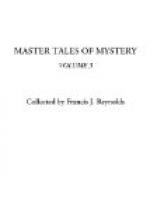“’Yes, you’ll get a good divorce now. But can’t we shut up this man Kennedy? Even if he can’t prove anything against us, the mere rumor of such a thing coming to the ears of Mrs. Tulkington would be unpleasant.”
Go as far as you like, Lawrence. You know what the marriage will mean to me. It will settle my debts to you and all the rest.’
“‘I’ll see what I can do, Close. He’ll be back in a moment.’”
Close’s face was livid. “It’s a pack of lies!” he shouted, advancing toward Kennedy, “a pack of lies! You are a fakir and a blackmailer. I’ll have you in jail for this, by God—and you too, Gregory.”
“One moment, please,” said Kennedy calmly. “Mr. Lawrence, will you be so kind as to reach behind your chair? What do you find?”
Lawrence lifted up the plain black box and with it he pulled up the wires which I had so carefully concealed in the cracks of the floor.
“That,” said Kennedy, “is a little instrument called the microphone. Its chief merit lies in the fact that it will magnify a sound sixteen hundred times, and carry it to any given point where you wish to place the receiver. Originally this device was invented for the aid of the deaf, but I see no reason why it should not be used to aid the law. One needn’t eavesdrop at the key-hole with this little instrument about. Inside that box there is nothing but a series of plugs from which wires, much finer than a thread, are stretched taut. Yet a fly walking near it will make a noise as loud as a draft-horse. If the microphone is placed in any part of the room, especially if near the persons talking—even if they are talking in a whisper—a whisper such as occurred several times during the evening and particularly while I was in the next room getting the notes made by my stenographer—a whisper, I say, is like shouting your guilt from the house-tops.
“You two men, Close and Lawrence, may consider yourselves under arrest for conspiracy and whatever other indictments will lie against such creatures as you. The police will be here in a moment. No, Close, violence won’t do now. The doors are locked—and see, we are four to two.”
THE BLACK HAND
BY ARTHUR B. REEVE
Kennedy and I had been dining rather late one evening at Luigi’s, a little Italian restaurant on the lower West Side. We had known the place well in our student days, and had made a point of visiting it once a month since, in order to keep in practice in the fine art of gracefully handling long shreds of spaghetti. Therefore we did not think it strange when the proprietor himself stopped a moment at our table to greet us. Glancing furtively around at the other diners, mostly Italians, he suddenly leaned over and whispered to Kennedy:
“I have heard of your wonderful detective work, Professor. Could you give a little advice in the case of a friend of mine?”




